"I had a flashlight," Cochran recalls, "but it was absolutely worthless. The smoke was so thick you could feel it. One step in, and you couldn't see the doorway. My uniform was starting to melt." Crawling on his hands and knees, he made three attempts to reach the source of the cries. "I couldn't find her the first time. The second time I had to come out for air. The third time I bumped into her. Then I stood up and walked her out. There were three explosions from residents' oxygen tanks. The third one sounded like a bomb going off. It shook the whole building.
"Trooper Cochran's actions demonstrate the commitment by police officers everywhere to protect and serve the public, regardless of the challenge," says IACP president Michael J. Carroll, chief of the West Goshen Township Police in West Chester, Pa. The IACP will honor Cochran -- and 20 other exceptional officers from across the country -- at its annual convention this week in Orlando, Fla.
Bowman was wearing little more than pedal pushers and a tank top when Cochran pulled her from the flames, but she didn't feel the 10-degree cold as her rescuer escorted her to an ambulance. She then spent a week in a hospital recovering from smoke inhalation. "Without Trooper Cochran, I would have died in that fire," she says. "I lost everything -- kitchen table and chairs, clothes, pocketbook, driver's license. Everything in the apartment, including my dentures. When I pray, I thank the Lord for Trooper Cochran."
Cochran has served the Virginia State Police for six years. "I love it," he says. "It's something different every day. I worked a governor's inauguration and the second inauguration of President [George W.] Bush. I like helping people. I'm a member of the community. I like feeling safe in my house, and I like for other people to feel the same way."
~~~~~~~~~~~~~~~~~~~~~~~~~~~~~~
Answering the Call
The following officers are also recognized for their outstanding work. (See the expanded story of each one lower in the article below.)
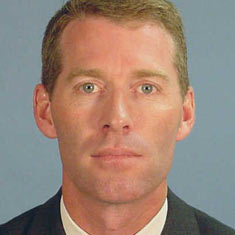 |
|
Sgt. William B. Hout of the San Diego County, Calif., Sheriff's Department investigated 13 violent drug rings. His work disrupted the activities of the Mexican Mafia prison gang and led to 33 federal and state criminal convictions. |
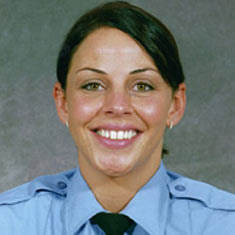 |
|
Officer Isabella Lovadina of the St. Louis, Mo., police was visiting friends when two robbers assailed them. Unarmed, Lovadina attacked the duo. They shot her multiple times and killed another person. The men were later caught and charged. |
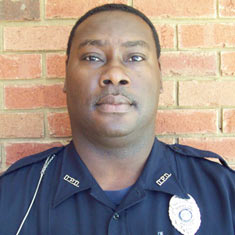 |
|
School Resource Officer Allen L. Harris of Dublin, Ga., averted disaster in November, taking a loaded handgun from an eighth-grader intent on shooting a rival gang member. The would-be gunman is now serving five years. |
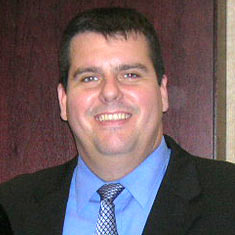 |
|
Officer Zach Hudson of the Lake Mary, Fla., police established a Senior Intervention Group. His team rebuilt an elderly man's house, served holiday dinners to 150, and established a referral service for needy seniors through local churches. |
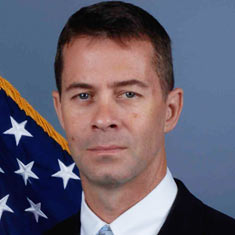 |
|
Special Agent W. Michael Lowe of the FBI spent years probing the 1999 disappearance of a 14-year-old Ozark, Ark., girl. Lowe's dogged detective work pointed to the child's aunt, who is now serving 40 years in prison for perjury and murder. |
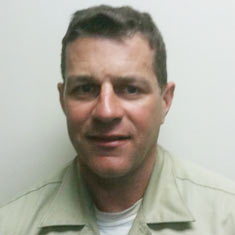 |
|
Deputy John Young, a motorcycle cop in the L.A. County Sheriff's Department, issued more tickets than any other deputy. His superiors credit him with reducing fatalities on his stretch of the Pacific Coast Highway to their lowest level in a decade. |
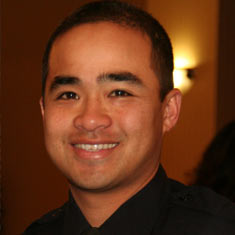 |
|
Officer Thi Huynh of the Garden Grove, Calif., police led a drive to collect money, food, and holiday gifts for the widow and six children of a dying man he had responded to. Huynh also helped the family obtain assistance for securing a home loan. |
PLUS MORE HONORABLE MENTIONS: (Click on their names to learn more about their heroic service.)
Youth Athletic League Deputy Art Valenzuela
Pentagon Officers Marvin Carraway, Colin Richards, Dexter Jones, and Jeffery Amos
DEA Officer Darrel Pasket
Foreign-deployed Advisory Support Team Officers Patrick McDarby, David Claasen, David King and Andrew Harris
~~~~~~~~~~~~~~~~~~~~~~~~~~~~~~
Lost in the Line of Duty
Special Agents Chad Michael, Forrest Leamon, and Michael Weston
U.S. Drug Enforcement Administration, Afghanistan
After destroying a narcotics stash and battling insurgents in the Afghan province of Badghis on the night of Oct. 26, 2009, seven specially trained DEA agents, accompanied by Afghan national police and U.S. armed forces, lifted off in two Army helicopters. One of the choppers, carrying four members of the DEA team, crashed. Three of the agents -- Chad Michael, Forrest Leamon, and Michael Weston -- were killed, and Group Supervisor Patrick McDarby was wounded. The three other agents -- David Claassen, David King, and Andrew Harris -- returned to the crash site in the other copter, helped escort 26 wounded to a collection point, treated their injuries, and held off the enemy until an Air Force gunship arrived and killed 27 insurgents. The agents remained on the scene until the following afternoon, recovering the remains of their comrades as well as weapons and critical gear.
~~~~~~~~~~~~~~~~~~~~~~~~~~~~~~
[Editor's note: The following is an excerpt from the prepared remarks of former PARADE Managing Editor Larry Smith for the Annual IACP General Assembly in Orlando, Fla.]
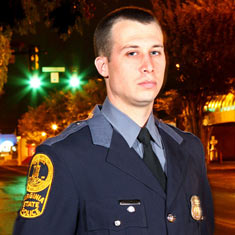 |
|
Distinguished Guests, Distinguished Chiefs, Ladies and Gentlemen:
It's hard to believe I've stood before you on this occasion annually for nearly 30 years. Where does the time go? And of course PARADE and the IACP have been collaborating for 44 years.
Time, or better, timelessness is an apt subject when we pause to look at the long blue — or gray or green, as the color of the uniform may be — line of officers, men and women, who have stood on this podium to accept your recognition. Their dedication and service date from the beginning and reach forward into a future that we know for them is endless because they will never quit. It's a comforting thought.
This morning's story is not greatly different from those we've encountered before: One frail soul in grave danger, and a law enforcement officer who did not consider that walking through fire was not part of his job description.
Emily Bowman was asleep in her recliner when the fire alarm sounded in her 40-unit apartment complex in Hillsville, Va., at 4:30 a.m. last January 9. |
She looked and saw flames licking under the doorway. She opened the interior door where she had seen the flames. Then Emily, a diabetic who was 71 at the time, panicked. Instead or retreating and going safely to a second door that led outside, she darted into the smoke-filled hallway, backed into a corner and started screaming.
State Trooper Matt Cochran, working the 9 p.m. to 7 a.m. shift, happened to be less than a minute away. The troopers' car radios carry department dispatches only but Trooper Cochran also had a personal scanner which gave him access to other departments plus fire and rescue units. He got there first.
Two other officers arrived about the same time and all three men began banging on doors and urging residents to come out. Hearing Emily's screams, Cochran went into the burning, smoky hallway on his hands and knees, as oxygen tanks exploded around him. "We had to run by the flames to get in," he said.
He had no protective gear. "I couldn't find her the first time," he said. "The fire was fully engulfed. I had a flashlight but it was absolutely worthless. The smoke was so thick you could feel it pressing against you. One step in, and you couldn't see the doorway. I had to make three trips inside to find her. My uniform was ready to start melting from the heat. I couldn't find her the first time. The second time I had to come out to get a breath of air. I could hear screams but couldn't tell where she was at. The third time I bumped into her. Then I stood up and walked her out. There were three explosions, from residents' oxygen tanks, while I was inside.The third one sounded like a bomb going off. It shook the whole building."
Emily was in pedal pushers and a tank top but, she said recently, she didn't feel the 5-degree cold as she walked out to a rescue vehicle on Trooper Cochran's toes. She was hospitalized for a week for smoke inhalation. "She was very lucky," the trooper said. "I'm quite a bit younger and I had an extremely hard time going in and out." From there she went to a nursing home and a month's rehabilitation. Trooper Cochran is 28. Emily is 72 now.
She was depressed when I talked to her a few weeks ago because her TV was out and she didn't know what was wrong with it. "But thank the Lord I'm alive," she said. "I want to thank Him for looking over me and, as for Trooper Cochran, I cannot thank him enough because, without question, I would have died in the fire. I would love to meet him and speak to him. I lost everything in the fire. I need a kitchen table and chairs. Everything is gone, clothes, pocketbook, driver's license, everything in the apartment lost, including my dentures. But it's good to be alive. When I pray, I thank the Lord for Trooper Cochran."
Deputy Sheriff Bobby Lyons and Hillsville Police Officer Ricky Hayes worked in concert with Cochran, kicking in doors and helping resident after resident until all 37 elderly occupants of the complex were led to safety. In he search for Emily, Cochran said, he and Lyons "worked together, trying to find her, one in one out, in case one of us got in trouble." The roof of several adjoining apartments collapsed shortly after. Four units were destroyed.
Trooper Cochran has been with the Virginia State Police six years. "I love it," he said. "I couldn't imagine doing anything else. It's something different every time I go to work. I get called to different parts of the state, I worked a governor's inauguration and the second inauguration of President Bush. I like helping people. I'm a member of the community and I like being able to feel safe in my house and I like for other people to feel the same way, knowing we are out there doing everything we can to enforce the law, catching criminals and helping folks as much as we can along the way."
And as Mike Carroll, our IACP president and chief of the West Goshen Township Police in West Chester, Pa., declared not long ago: "Trooper Cochran's action demonstrates the commitment by police officers everywhere to protect and serve, regardless of the challenge."
Matt is still working more or less in the neighborhood but he still has not seen or heard from Emily Bowman since the night he saved her life: All in a day's work.
Ladies and Gentlemen, please join me in saluting our 45th IACP-Parade Police Officer of the year, Virginia State Trooper Matthew Cochran.
~~~~~~~~~~~~~~~~~~~~~~~~~~~~~~ [Editor's note: The following is an excerpt from the prepared remarks of former PARADE Managing Editor Larry Smith for the Annual IACP General Assembly in Orlando, Fla.]
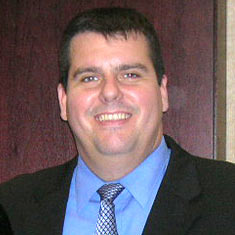 |
|
Zach Hudson, from Lake Mary, Fla., has always related to older folks, especially since his grandparents took a hand raising him and his brother while their mother struggled to make ends meet working two jobs. He grew up around the elderly.
He has been with the police nine years. His idea to form a Senior Intervention Group came two years ago. The catalyst came that winter when he was out on patrol and went to the very cold home of two old ladies, one 76 and the other 91.
"They didn't have power, nor food, nor most of the medications they needed," Zach told me. "They said they had to choose every month on whether to pay for power and the rent or whether to buy medicine and food. That kind of got to me. I thought, we've got to do something to deal with this."
The key to the success of the whole project, Zach said, was his chief, Steve Bracknell. "I was very fortunate to have a chief who was an outside-the-box thinker. That made a big difference. When I brought the senior intervention group concept to him, he got behind it in a big way. I went to the churches, spoke to the pastors and other individuals. Our churches provide billions overseas while people here are suffering." |
The concept was simple: Nine faith-based organizations, churches mostly, and a number of businesses agreed to volunteer help for the elderly, as needed, as referred by the police department.
Referrals start with a street-level officer who encounters a senior who may need yard work, an electrical outlet, an alarm installed, or a ride to the store -- it can be anything, Zach said. "A senior might need help if his medication drops behind the dresser and he can't reach it."
The street-level officer files a report and then the appropriate volunteer is contacted, and takes over. "We rebuilt a man's home from the ground up in three months. He did not have running water and his home was going to be condemned. Twenty volunteers from local churches came. I got out there every Saturday. We stripped it to the studs. We only spent $1500. It would have cost $20,000."
"I looked for a Senior Intervention Group model initially to try to reproduce but couldn't find anything. I don't know of anybody else in the country doing this." An important part of the program is that it helps prevent seniors from being victimized by fraud. There have been inquiries from some other local jurisdictions.
There's about 400 seniors on the list. They are not charged for anything. Right now there's a bunch of turkeys on the menu, for Thanksgiving. Zach will be there.
He and his wife Nelsy have Tattiana, 5, and Bryson, two, one of each, he said. "I think we're good now."
~~~~~~~~~~~~~~~~~~~~~~~~~~~~~~
Editor's note: The following is an excerpt from the prepared remarks of former PARADE Managing Editor Larry Smith for the Annual IACP General Assembly in Orlando, Fla.]
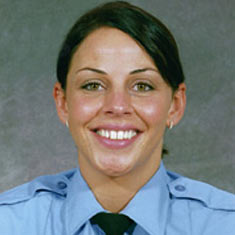 |
|
The St. Louis PD has a remarkable officer named Isabella Lovadina, who's only 28 years old. She was off duty, unarmed, in street clothes and visiting friends. As she and a couple others stood outside two men, one 16, one 22, confronted them with drawn weapons, a .22 and a .25, and ordered them into the house. It was going to be a crime of opportunity. There were six adults and two little boys. The two robbers grew increasingly violent with their threats over a period of about 20 minutes, said they were going to shoot the little boys and finally ordered everyone into the basement, damp, dingy and dark.
"I don't want to say I wasn't scared," Isabella told me Oct. 5, a year to the day since the incident, "but I was focused on getting everybody else out of that situation. I tried to remain calm. The threats were getting worse by the minute. I knew they didn't have a plan. Then they wanted Gina to go down in the basement and I thought they were going to rape her and kill her, and what if the little boys come up?
"I thought it's now or never, we're going down anyway. I'm going (to be killed) but maybe I can prevent it for the others. I didn't want to die but I was okay with it, if they lived. I took a look at the gun and lunged. I blacked out at that point but I remember gunfire and fighting. She was hit five times, three in the chest. The last shot hit my right arm like a sledgehammer. I thought I can't fight any more, this is it." |
The second robber stepped up and shot her as she struggled with the first one.
They killed Isabella's friend Gina, wounded a third person and fled. The first robber evidently was shot in the hand by his partner as he struggled with Isabella, and they were captured when they went to a hospital for treatment.
Isabella revived, told herself she had to remain calm and focused. One of the boys called 9-1-1. When help came she gave a full description that led to the arrest at the hospital. She had a severed artery and nerve in her arm, a collapsed lung, and a bullet went through her leg, through her uterus and lodged in her pelvis. "I can still have children," she told me. "I'm blessed in that too." She's here with her boyfriend Timothy Hughes, a fireman.
Isabella was out of the hospital in five days, but she's still on limited duty at the department, still having trouble with the arm. Mentally, she said, "It depends on what day you ask me, but I'm coming around. Regardless of what I do I can always go back to school. You can always use an education." School of hard knocks. Man.
~~~~~~~~~~~~~~~~~~~~~~~~~~~~~~
Editor's note: The following is an excerpt from the prepared remarks of former PARADE Managing Editor Larry Smith for the Annual IACP General Assembly in Orlando, Fla.]
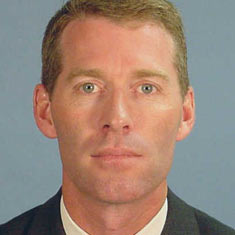 |
|
We've got some interesting officers from California this year.
William B. Hout, who is 42, trained dogs for law enforcement before he joined the San Diego Sheriff's Department in 1993.
He just got promoted to sergeant, in no small part because of his remarkable work in the past several months in which he was a participant or lead investigator in over 13 major violent gang/and or drug investigations, focusing especially on the Mexican Mafia.
As of May his efforts, along with his fellow investigators, led to 59 indictments and 33 convictions with more pending. It's not easy once they're in jail either because they can run criminal activities even from inside.
One thing I admire about him especially was the way he went after a Hells Angel suspect who had overtly harassed a deputy in the company of a child because the deputy was scheduled to testify against the biker in a pending case.
Sgt. Hout takes no nonsense, from nobody. |
He and his wife Terri are the parents of Taylor, 14; Lori, 12; Billy, 6; and Robbie, 4.
~~~~~~~~~~~~~~~~~~~~~~~~~~~~~~ [Editor's note: The following is an excerpt from the prepared remarks of former PARADE Managing Editor Larry Smith for the Annual IACP General Assembly in Orlando, Fla.]
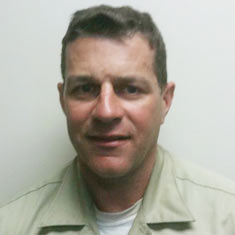 |
|
Up the road, in Malibu, there's a hard-charging motorcycle deputy named John Young, who rides for the Sheriff's Department. I enjoyed talking with him because I happen to have a motorcycle myself and I was even more pleased to learn that he and his fellow officers ride BMW's because ... you can guess why (My bike is a BMW). He says the Harleys don't compare in handling and stopping, even acceleration. He also is a strong believer in the helmet law, which California has. He says those who oppose it don't take into consideration the costs to society of supporting for years a crashed biker with a traumatic head injury.
It turns out his area -- Canyon Road between 101 and the Pacific Coast Highway -- is internationally known for motorcycle riding. Guys like James Dean and Steve McQueen, even Ronald Reagan used to hang out there. They come from Asia and Germany to ride there. The roads are legendary. The Rock Store, one of the most famous motorcycle hangouts in the world, is right there, on Mulholland Highway between Malibu and Calabasas. You might run into Jay Leno or Arnold Schwarzenegger.
John, who's 45, says the speed limit on the coast highway is 45 but (I have the secret) you're safe right up to 59 miles an hour. |
Beware if you go past that, though. He gave out 3800 citations last year. His bosses say his vigilance led to the lowest annual number of fatalities on the Pacific Coast Highway in ten years. He also goes after those loud Harleys.
John says his lady friend rides with him too, but on the back of the bike. I'm trying to get my wife to do that too. She thinks I'm nuts.
The LA Sheriff's Department had had quite a year with the IACP. When I caught up with Art Valenzuela, the Youth Athletic League deputy, he was at the market buying the ingredients for chicken cheese enchiladas he was going to prepare for 20 kids. "I never made it before," he told me. "It's a mystery meal for all of us."
Art rides herd on roughly 50 elementary and secondary schoolkids, picks them up at the end of the day and takes them to the park where they get snacks and do their homework first, ge3tting help if they need it.
He takes them all over the place, with focus on aerobic exercise, drug awareness, helping and feeding the elderly, hiking, internet awareness, even Mozart at the Hollywood Bowl. They took crackers and cheese and little salamis, and apple cider. "I love opening doors for them," he said. "If we don't, they'll never do it on themselves. I took a 16-year-old boy to the beach. He had never been. He was in awe. He thought it was a white person kind of thing.
He takes them to colleges, has them sleep there, let's them see the range of possiblities in life. "The kids go to class, they say Hey this is possible for me." There are possibilities outside the gangs.Sixteen different units in the sheriff's department work with hundreds of children in this way. "Some of them call me Dad," Art, who is 38, said. "I've had little ones say they want me to walk them down the aisle."
He's making a diffference.
~~~~~~~~~~~~~~~~~~~~~~~~~~~~~~
Editor's note: The following is an excerpt from the prepared remarks of former PARADE Managing Editor Larry Smith for the Annual IACP General Assembly in Orlando, Fla.]
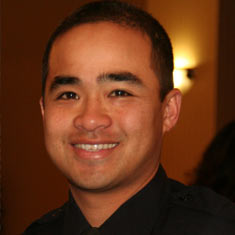 |
|
Somewhere out there in southern California, actually in a place called Garden Grove not far from Disneyland and Anaheim, there's another cop who made a difference, Thi Huynh, whose parents escaped Vietnam in 1979. "They were boat people," he told me. Thi is 29 years old, and a bachelor. He's been with the force since 2007. He's been cited for resuscitating a prisoner who had stopped breathing and he also saved a 15-year-old boy who'd been in cardiac arrest.
A year ago, November 28, Thi got called to the scene of a fatality, where a father of six had suffered a heart attack and died, right in his driveway. Thi got there, learned there were six children between the ages of 4 and 16, and a stay at home mom and thought to himself, what's going to happen to these kids come Christmas?
"I wanted people to know we really do care, that we were not the sort to just take a report and leave. We went to the mom and she wasn't looking for a hand-out but we got a list from her, and raised between $1300 and $1400. He also contacted the United Labor Agency . "We started out with one for each kid and ended up with a ton of toys, making it a Christmas they'd never forget." He also got the labor agency involved in talking to the bank to adjust the mortgage so the family could remain in their home. "She's trying to be a nurse," he said. "They're just good people." |
Thi's folks made it from Vietnam to Indonesia in ‘79, where his sister was born, then they got to the states, where he was born in 1980. He grew up, a hot high school quarterback and sports nut who went to college in Hawaii, for the surfing. "They were strict, old-school," he said, "and for them education comes first."
Thi was a good son; now he's a good man.
~~~~~~~~~~~~~~~~~~~~~~~~~~~~~~
Editor's note: The following is an excerpt from the prepared remarks of former PARADE Managing Editor Larry Smith for the Annual IACP General Assembly in Orlando, Fla.]
There were a number of dramatic incidents involving gunfire among this year's nominees -- in fact, the judges could easily have recognized a half dozen that were truly noteworthy. Chief among them was the story of John Patrick Bedell, a Californian who made his way to the Pentagon at 6:36 p.m. last March 4.
Officer Marvin Carraway was standing in front of the "mobile pre-screening booth," a big plastic shield on wheels. Bedell pulled out a 9 mm handgun and fired two or three times at Officer Carraway from 7 feet away, or less, before he could take cover. That's point blank range. One slug grazed Carraway's hip.
Bedell kept going. "I knew I was hit," Marvin told me, "but I could not stop to check the severity of it. The only thing on my mind was stopping him before he got into the building."
But he had to wait for a clear path to fire without endangering bystanders. Fortunately there were three other officers on duty, Colin Richards, 29, Dexter Jones, 46, and Jeffery Amos, 47. Bedell ran toward Amos, shooting as he came. He hit Amos in the shoulder before he could return fire with a submachine gun.
Bedell dropped. He had two handguns, 1200 rounds of ammunition and some kind of machete on his back. He was stopped by a round to the head. All four officers got shots off. The results as to who fired the fatal round were inconclusive.
Marvin is 44. He and his wife Lily have a son Timothy, 19. They live in Clinton, Md. He said the Pentagon force protection group had gone through a training scenario a month before they encountered the actual event with Bedell. Marvin has been with the Pentagon unit since 2008.
Happily all four wore bulletproof vests. Happily Bedell was a bad shot. "I thought there was nothing but angels there protecting us," Marvin said. "It was very fortunate none of us or any bystanders got hurt." He spoke to h Lily from the hospital. "I said I'm okay, not to worry, I'll be home soon." He added to me, "It's all in a day's work. We were doing our jobs that night."
~~~~~~~~~~~~~~~~~~~~~~~~~~~~~~
Editor's note: The following is an excerpt from the prepared remarks of former PARADE Managing Editor Larry Smith for the Annual IACP General Assembly in Orlando, Fla.]
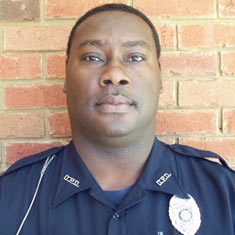 |
|
Sometimes the real drama can only be imagined, as was the case at Dublin Middle School in Georgia a year ago November. We're talking sixth to eighth graders. School Resource Officer Allen L. Harris thought something was odd when he saw a bunch of eighth graders coming to the lunchroom with their book bags, so he sent them all back to their lockers. Then he heard from a student that another boy from a rival gang was planning to set off the fire alarm as a distraction then draw a gun a shoot him. Just then the fire alarm went off. Officer Harris locked him safely in a classroom then went to the cafeteria where he saw the suspect and took him to his locker where he had left the book bag. "He kept looking at me; he wouldn't pick up the bag. I drew my gun. He had a loaded 380 pistol in there. He reached for it, hesitating. By God's will he obeyed." Jerell Carey, 15, a member of Bloods, had transferred from Miami where a cousin had been killed by Crips. The boy he aimed to shoot was a Crip. Is this stupid, or what?
Jerell had taken the gun on the bus and bragged about what he wa going to do. "All the kids knew about it, none of them said anything. That to me was the crazy part. They knew he had a fun and they were goingf to let him shoot even though he might have killed one of them."
He got five years in a maximum security facility for juveniles.
|
When we spoke a year later, Allen was still nervous at the thought of what might have happened had the boy opened fire in the cafeteria. "With all those kids around I would have to shoot him in a crowd of people. I'm glad I was in God's favor that day. You would have heard about it on CNN."
He works three schools; he knows most of the kids by name. He says he's more of a counselor than he is a cop. He said the idea for a school resource officer had been proposed by his chief, Wayne Cain, some years before. After the incident a 7th grade math teacher wrote a letter praising Allen not only for his action then but especially for the way he addressed a crowd of nervous parents a day or two later and calmed everybody down. "He is truly one of a kind," she said.
Allen, who is 40, and his fiancee Bonita are planning to marry next April.
~~~~~~~~~~~~~~~~~~~~~~~~~~~~~~
[Editor's note: The following is an excerpt from the prepared remarks of former PARADE Managing Editor Larry Smith for the Annual IACP General Assembly in Orlando, Fla.]
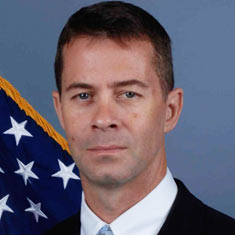 |
|
FBI Special Agent Michael Lowe got involved in the disappearance of 14-year-old Christine Richert when the State Police asked for help in finding the girl's mother, who had moved to California, leaving the girl in care of her husband's brother Bubba and his wife Wanda.
This gets complicated so I'm going to simplify. Wanda got into a fight with her niece, drowned her in a bathtub and had Bubba bury her in Ozark National Forest.
Various stories were told about Christine's disappearance for years until Donna Walker, who had adopted Christine's brother, called the cops. "We knew something was wrong, that something had happened to the child," Agent Lowe told me. "We wanted to know. No one seemed to care, except a handful of people. That's what we do. Somebody responsible needed to pay for it."
Agent Lowe stuck to the case, at first treating Bubba like a wannabe helpful person until he finally got enough information to pressure, I mean persuade, him into admitting what happened and implicating his wife Wanda. Altogether the case stretched over ten years. |
They dug up half the forest looking for the body but they never found it. Bubba pleaded guilty to hindering apprehension and got 20 years while Wanda eventually pleaded no contest to second degree murder and is now serving a 30-year term.
Agent Lowe and his wife Cindy are the parents of Savannah with an "h," who is 12, and Stuart, 10.
~~~~~~~~~~~~~~~~~~~~~~~~~~~~~~
Editor's note: The following is an excerpt from the prepared remarks of former PARADE Managing Editor Larry Smith for the Annual IACP General Assembly in Orlando, Fla.]
DEA personnel brought us some remarkable accomplishments this year, going out of the box to distinguish themselves. When the earthquake struck Haiti on Jan. 12, Darrel Pasket, the country attache stationed in Port au Prince, and his staff jumped in with both feet.
Their job is to work with the national police investigating drug traffic, especially to the U.S. Haiti is a transit country for cocaine smuggled out of South America, typically in small craft from Venezuela, landed in clandestine airstrips around the country then sold to Haitian traffickers who smuggle it into the Bahamas in small sailing vessels. Bad guys who get caught can be extradited to the U.S. and incarcerated.
Well, when the quake hit, Darrel said, "We recognized here in the DEA that we have certain skill sets that could be lent to the effort," and not just for security. He and his staff did help provide control the thousands of Haitians pleading for help, processed thousands for evacuation, looked after orphans, helped get the injured to hospitals and even transported millions in cash from banks to the embassy to speed USAID emergency efforts. They also helped obtain emergency supplies and mentored the Haitian National Police as they tried to pulled themselves together. He said it will be decades before Haiti recovers. He and his wife Stella lost their home in the quake, one of 45 embassy homes destroyed.
More than 230,000 died in the disaster, including a State Department colleague who died in the collapse of her house. The first three weeks were just a blur, he said, with him and his staff going nonstop daily from 6 a.m. to midnight and beyond. People were sleeping on cots and under desks. This story could go on all afternoon. Darrel and Stella have four children, all grown, and a grandchild. He's a spritely 50 years of age, has been in Haiti three years. We admire law enforcement folks who step outside the box.
~~~~~~~~~~~~~~~~~~~~~~~~~~~~~~
Editor's note: The following is an excerpt from the prepared remarks of former PARADE Managing Editor Larry Smith for the Annual IACP General Assembly in Orlando, Fla.]
A stirring example of that occurred a year ago today, in Afghanistan, where seven DEA agents went to execute a search warrant in the middle of the night. They are called FAST or Foreign-deployed Advisory Support Teams, and the DEA has five of them. This unit, under Group Supervisor Patrick McDarby, had been together since 2005. Their job is to advise and support local police forces, train and mentor them and go on raids. Deployments are typically from 3 to 5 months.
"We've been in three countries," McDarby said. "My wife gets a little tired of me being away but we love it." He and Flor have two children, 3 and 1.
Supported by coalition and Afghan Police counterparts, 50 altogether, the mission went off without a hitch, even in the face of automatic weapons and rocket propelled grenade fire. The hostile fire was suppressed and everyone retreated to two Army Chinook copters. One copter, carrying Pat and three other DEA agents gaianed altitude, lost airspeed and crashed on top of the bazaar.
The second copter returned. McDarby, himself a medic, was hurt but managed to get out of the wrecked copter. He and the survivors of his team, David Claasen, David King and Andrew Harris, disregarded the continuing danger and gunfire for the next several hours while they extricated 26 wounded from the downed copter and get them medevaced out for medical help. Ten died in the crash. The copter was engulfed within fifteen minutes.
Lost were Forrest Leamon, Chad Michael and Michael Weston. Leamon's wife had a baby in May, Michael was single, and Weston left a wife. The agents' remains were recovered later that morning.The reason MdDarby and his team could not be here today is that they are attending dedication ceremonies for their slain colleagues in other parts of the country. They will all be speaking. In the past year they've put on benefits, golf tournaments, road races and other fund-raisers all over the country in memory of Leamon, Michael and Weston.
|